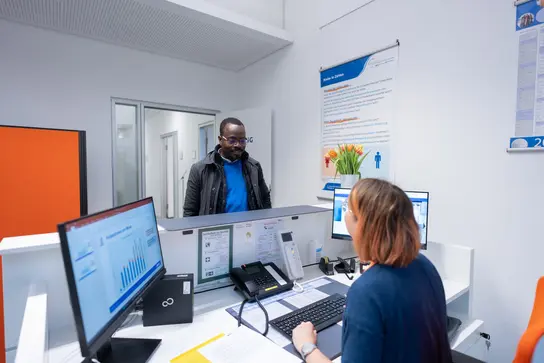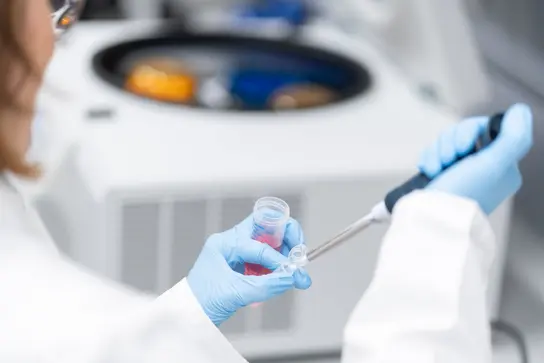Prevention Outpatient Clinic
With the Prevention Outpatient Clinic, a Germany-wide unique, population-based study center for cancer prevention is being established at the National Cancer Prevention Center. Here, citizens receive comprehensive quality-assured information and individual counseling on health promotion, cancer prevention and early cancer detection. Together with prevention research scientists, citizens can develop and test new methods and programs in innovative prevention studies.

Information and advice

The Cancer Information Service of the German Cancer Research Center (DKFZ) and the INFONETZ Krebs of the German Cancer Aid provide general information on cancer risk factors as well as on prevention and early detection. In addition, citizens seeking advice can obtain individual medical advice at the Prevention Outpatient Clinic. a personal cancer risk profile is drawn up so that recommendations can be tailored to the individual situation. Participants are first asked to complete a digital questionnaire followed by a personal consultation with doctors at the Prevention Outpatient Clinic. The questionnaire can be completed either online from home or on site at the Prevention Outpatient Clinic. Based on this information and using a specially developed prevention counseling guide, an individualized, physician-based prevention recommendation is provided. This evidence-based recommendation aims to promote the health of the individual test person in a targeted way.
The Prevention Outpatient Clinic team is planning a number of activities to encourage people to adopt a health-conscious lifestyle and help them live healthier lives. These include developing and establishing group programs that include behavioral therapy, motivational and psychoeducational elements. Group nutritional counseling and physical activity programs will also be offered to address and improve cancer risk factors such as "unhealthy eating," "obesity" and "lack of exercise", which are becoming increasingly important. Trained staff will initiate smoking cessation counseling using the "Smoke Free Ticket." In addition, other complementary external services will be offered, such as additional smoking cessation programs, and sports and exercise opportunities, individual nutrition counseling as well as age- and risk-appropriate cancer screening examinations and genetic counseling.
The Prevention Outpatient Clinic will provide specific contacts and, if necessary, assist with referrals by arranging initial external appointments.
Prevention and early detection services that are already established and available nationwide (e.g., at general practitioners and specialists) are thus be complemented and supported. Routine care is explicitly not part of the Prevention Outpatient Clinic program.

In order to monitor the long-term effectiveness and sustainability of the counseling, appointments are made for follow-up visits at the Prevention Outpatient Clinic. Citizens participating in the Prevention Outpatient Clinic program also have the opportunity to voluntarily provide biosamples (blood, urine, stool) for prevention research.
All services offered by the Prevention Outpatient Clinic are scientifically evaluated.
Study Center for Cancer Prevention
In the Prevention Outpatient Clinic, citizens have the opportunity to participate in innovative prevention studies conducted by the DKFZ and its partner institutions. These studies cover various areas such as the recording of genetic risk profiles, the establishment of new biomarkers, the development of new methods of radiological early detection or innovative app-based early detection methods. In addition, specialized research studios will be set up in which nutrition and exercise studies will be carried out in the future. Here, for example, the impact of lifestyle on cancer risk will be investigated and methods and tools to promote a health-conscious lifestyle will be developed.
Current study portfolio
The European 4-IN-THE-LUNG-RUN study is preparing for the widespread introduction of a lung cancer screening program for high-risk groups. International studies have shown that regular radiological examinations of the lungs by low-dose MSCT (multi-slice computed tomography) can significantly reduce lung cancer mortality in smokers. Germany is participating in this study with two sites. One of them is located at the DKFZ in Heidelberg and is led by the Cancer Epidemiology Division. The 4-IN-THE-LUNG-RUN study is now investigating the optimal screening interval.
MoreThe LEO study is a large-scale, scientific study conducted by the division Primary Cancer Prevention at the DKFZ and the National Center for Tumor Diseases (NCT) Heidelberg in collaboration with the Interdisciplinary Endoscopy Center Heidelberg (IEZ), a Department of Medicine at Heidelberg University Hospital. The main objective of the LEO (Living Without Colorectal Cancer) study is to discover and evaluate new screening tests for the early detection of colorectal cancer and its precursors in young adults. In addition, the study aims to investigate the incidence of the disease and how best to identify high-risk groups who may already have colorectal cancer precursors.
The data collection for this study has been completed.
The PROBASE study (Risk-adapted prostate cancer early detection study based on a "baseline" PSA value in young men) is led by the division Personalized Early Detection of Prostate Cancer and the division Cancer Epidemiology at the DKFZ. The study is based on the observation that the baseline prostate specific antigen (PSA) level at the age of 45 to 50 years is highly predictive of whether a man will develop prostate cancer years later. The main goal of the study is to develop a prostate cancer screening strategy to detect aggressive, prostate cancers that require treatment in a timely manner. At the same time, the modern concept of PSA testing should enable the early detection of aggressive, treatment-naive prostate cancers and thus minimize the risk of men risk being confronted with distressing false-positive findings and over-diagnosis and over-treatment.
MoreThe LION RCT study(Randomized Controlled Exercise Intervention Study) is being conducted as part of the EU-funded project PREFERABLE II project in cooperation with the Division Physical Activity, Prevention and Cancer of the German Cancer Research Center and the Oncological Sports and Exercise Therapy Group of the National Center for Tumor Diseases (NCT) Heidelberg. The LION-RCT study investigates how an online training program is accepted and how effectively it can alleviate various symptoms after cancer treatment. The target group is people who have undergone cancer treatment. The participants are instructed at home by a certified trainer via a video conferencing platform. More
MoreNotice
The studies listed here are conducted according to specific study protocols. These protocols have clear inclusion and exclusion criteria that define who can and cannot participate in the study. They also describe how participants are enrolled into the study. Further information on this and the relevant contact persons can be found on the websites of the respective studies.
Data and biomaterial base for prevention research
To generate new knowledge and advance modern prevention research, the German Cancer Research Center is developing a comprehensive database for research at the National Cancer Prevention Center. In the process, medically collected data, including biosamples, are compiled in compliance with all applicable data protection regulations and made accessible for research.
Biosamples are collected as part of studies investigating (epi-)genetic, metabolic, inflammatory, microbiotic and infectious profiles. This comprehensive collection of biosamples is stored in the Dieter Morszeck Biorepository of the DKFZ. The collected data and biomaterials form a broad and detailed basis for research that is continuously growing as a learning system. The knowledge gained is in turn used to update and further develop the evidence-based information and counseling services. In this way, improved prevention strategies and programs can be developed on an ongoing basis.
Roll-out
The Prevention Outpatient Clinic model is being developed, piloted and established at the National Cancer Prevention Center in Heidelberg. This model will be gradually transferred to other locations. The long-term goal is to provide all citizens with fair access to personalized prevention counseling and appropriate prevention studies.
To achieve this goal, multicenter prevention studies will be established in collaboration with partners in the future. Established structures such as the Comprehensive Cancer Centers (CCCs) of the German Cancer Aid and the sites of the National Center for Tumor Diseases (NCT) and the German Consortium for Translational Cancer Research (DKTK), which are linked to the DKFZ, are strong research networks working in partnership and are therefore ideal candidates for large-scale prevention studies. In addition, important regional partnerships are also gradually being established outside university medicine. These include, for example, collaborations with general practitioners and specialists as well as prevention experts. Collaboration with various partners will ensure that prevention measures are widely accessible and can be implemented effectively.
Get in touch with us

Dr. Ursula Will
Medical Director Prevention Outpatient Clinic
Alexandra Kempf
Study Assistance